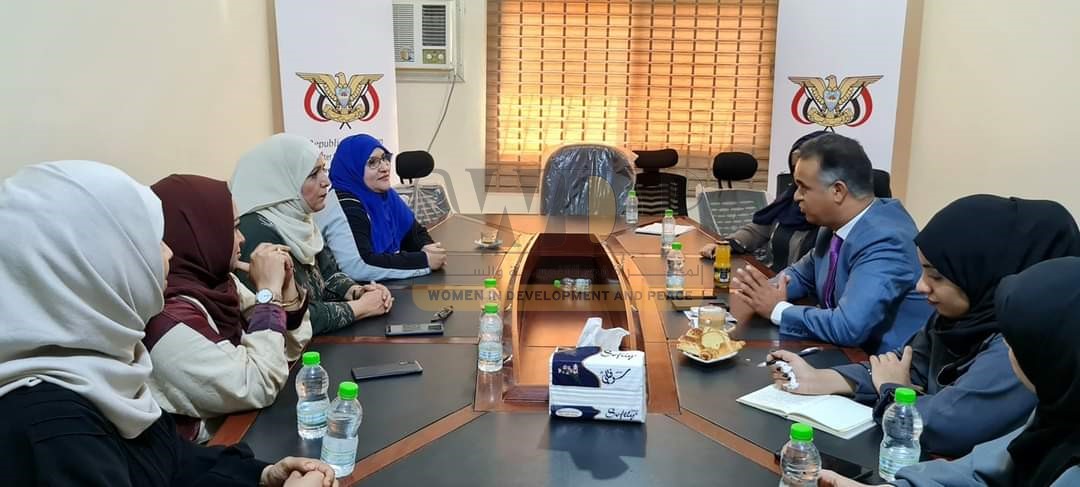Yasmine Abdulhafeez – Women in Development and Peace
Women in Yemen are among the most severely impacted by the ongoing conflict, which has raged for over nine years. Shocking UN reports confirm that Yemen has become the worst place in the world for women to live, reflecting the tragic reality faced by Yemeni women across all governorates and regions.
Yemeni women, especially those working in the public sector, face another kind of struggle. They are engaged in a fierce battle for survival and a dignified life, amidst harsh conditions that threaten their lives and futures. The destruction of government facilities, the suspension of their salaries, the soaring cost of living, the lack of jobs, and the absence of security, which endangers their lives, are major challenges. Restrictions on their freedoms have left them unable to move freely, find better opportunities, or live with dignity.
Female Employees Affected by the Conflict
Jamila Ali, a teacher from the city of Hodeidah, tells us the story of the thousands of Yemeni women forced to flee their homes and seek safety in other areas due to the ongoing conflict in the country.
Jamila was forced to relocate from Hodeidah to one of the districts of Taiz after her salary was stopped and the conflict in the city intensified, leading to a deterioration in her living conditions and those of her family.
Speaking to Women in Development and Peace newspaper, Jamila says: “We were besieged by hardship from all sides. My salary, along with those of other government teachers, stopped in the city. Many business owners also fled, and many private institutions closed down. There were no opportunities to find other work that could provide a decent life for my children, especially since our living conditions deteriorated with the rising prices of food and fuel shortages. Therefore, I decided to search for a place better than Hodeidah, especially since my husband’s salary was also stopped as he is a government employee.”
She adds, “It’s not just me and my husband who have been affected by the conflict, which has led to the cessation of our salaries and the deterioration of our living conditions. Many employees in the city fled the consequences of the conflict, which has had a significant impact on daily life, especially for us working in the public sector. We all scattered and migrated to different Yemeni cities in search of suitable work that would guarantee a dignified life, even if it was outside our field. The most important thing is to provide for our children.”
Jamila had to leave her home, a place where she had invested significant money, and her jewelry collection. This house was a symbol of her stability, security, and a brighter future for her children. However, the ravages of the conflict shattered her dreams, forcing her to evacuate with her children. Despite the hardship, Jamila never lost hope. With every step she took during her displacement, she prayed for the country’s situation to improve and for her to return home soon.
Jamila shares her story: “I was displaced to my village in the countryside of Taiz due to the conflict, where I stayed for about eight months. When the government started to pay salaries again, I decided to return to Taiz City, hoping to improve my living conditions. I started teaching at one of the schools in Taiz, but the salary I received was not enough to cover my basic needs. It was only 70,000 riyals, which wasn’t enough for rent, which was 90,000 riyals, let alone other expenses such as water, electricity, and children’s expenses. So, I decided to look for an additional job at a private school to meet my basic needs and improve my living conditions.”
She adds: “The purpose of teaching at a private school is to provide a good education for my children. By doing so, I could pay their tuition fees in exchange for teaching. For the rest of the expenses that I couldn’t afford, I was forced to find another job like a project to meet the rest of my family’s needs.”
Jamila rented a school cafeteria where she used to work. She furnished it and stocked it with food items such as cheese, biscuits, bread, juices, and more. She also hired a woman to work there in exchange for a monthly wage. Despite Jamila’s efforts to meet her family’s needs, she still struggles to cover all the necessities of life due to the high cost of living in the country.
The suffering caused by the conflict and its consequences is borne by the citizens. After her salary was cut off, Jamila faced challenges when she moved to different places. Many female teachers, like her, have been displaced to various regions. Unable to find alternatives to support their families, they experience frustration and psychological issues, including depression and anxiety.
Numerous women working in the government sector highlight how the conflict significantly impacts their family lives. Some have had to withdraw their children from education to search for work, taking on responsibilities early to prevent hunger for themselves and their siblings. The loss of jobs and salaries has left many mothers struggling to provide for their families.
The Salary Crisis
Teacher Samar Ahmad also narrates that many female employees in the government sector have been forced to take on temporary jobs, such as selling ice cream from their homes, preparing women’s clothing, or selling various meals in parks and gardens, as well as in markets, to save themselves and their families from hunger, homelessness, and destitution.
Samar wonders, “How can a teacher survive on just two salaries per year? She receives half her salary before Ramadan and the other half during Eid Al-Fitr. The second salary is split into two payments at the beginning of the year and during Eid al-Adha.”
Muhammad Aabid, the executive director of the Conscience Foundation for Rights and Freedoms in Shabwah Governorate, southern Yemen, believes that Yemeni women working in the government sector face significant challenges, especially due to low salaries and interruptions in many Yemeni governorates caused by the conflict. The conflict has led to economic and living conditions deteriorating for many families, along with the devaluation of the local currency against foreign currencies.
He added to Women in Development and Peace newspaper: “One of the negative consequences of the conflicts affecting women working in the government sector is that they have been unable to reach their workplaces due to security conditions in many Yemeni regions. As a result, they have been unable to carry out their usual government work activities as before.”
The Aftermath of the Displacement Wave
Mahra Governorate, located in eastern Yemen, has been spared the worst of the country’s ongoing conflict thanks to its geographical location, which has kept it out of the direct fighting that has ravaged many other parts of the country. This has allowed Mahra to remain relatively stable. However, Mahra hasn’t been entirely untouched by the conflict. Its effects have impacted the lives of Mahra women in indirect ways.
These impacts include rising unemployment due to the influx of displaced people from affected governorates. This influx has created a tougher job market for women, leading to a lack of opportunities. Additionally, disrupted transportation routes caused by the conflict have increased prices for goods, further exacerbating the economic strain. Basic services such as healthcare and education have also experienced decline, negatively affecting the overall well-being of the population. Furthermore, economic and psychological pressures stemming from the conflict have contributed to a rise in violence against women, particularly domestic violence.
Noor Abdulaziz Makki, a social and cultural activist from Al-Mahra, confronts significant challenges amidst the ongoing displacement wave. This wave disproportionately affects women, posing a direct threat to their employment opportunities and advancement within the community. Unfair competition arises as displaced women compete for limited job openings, thereby reducing the chances for local Al-Mahra women to secure suitable positions.
Notably, experienced and qualified women from other regions often compete for public or private positions, surpassing the opportunities available to local Al-Mahra women.
The influx of displaced women sometimes comes at the expense of educational and knowledge opportunities for Al-Mahra women.
Solutions to Alleviate the Suffering of Working Women
Muhammad Aabid, calls on government entities to take concrete steps and measures to promote gender equality in government institutions. This includes ensuring equal opportunities for men and women in employment, promotion, and training, as well as granting women all their rights. These rights include providing them with leave accommodations that cater to their nature and role in raising their children, ensuring adequate healthcare, especially during pregnancy and childbirth, and fostering a societal awareness regarding empowering women in government agencies. This would also include recognizing their contributions to development, encouraging their participation in public events and activities, granting them the right to make decisions, and empowering them in leadership positions.

Kamal Al-Shaush, a journalist and human rights activist from Hodeidah Governorate, believes that the conflict in Yemen has significantly impacted women in the government sector. He highlights how many female government employees have been forced to start their own businesses due to salary cuts and harassment in their workplaces in different governorates. He adds that many women have taken on different jobs, abandoning their government positions.
Regarding solutions to improve the situation of working women in the government sector, Al-Shaush says, “The participation of Yemeni women in any negotiations between the warring parties will enable them to voice their concerns and demands. This will have a positive impact on the peace and development plan. The absence of women’s representation in political negotiations is one of the most significant impacts of the conflict on women’s role in the government sector.”
He adds, “Another solution could be to transfer female employees administratively from institutions facing financial crises to other institutions capable of paying their salaries. I also urge international organizations working in the humanitarian field, particularly those focused on women’s development, to assist government employees by directly paying their salaries or supporting government institutions facing liquidity shortages. These women are few compared to those working in the private sector.”
The salary crisis affecting government employees due to the conflict poses a serious threat to the stability of families and communities in Yemen. There are calls from the community addressed to all concerned parties to work together to address this crisis urgently

